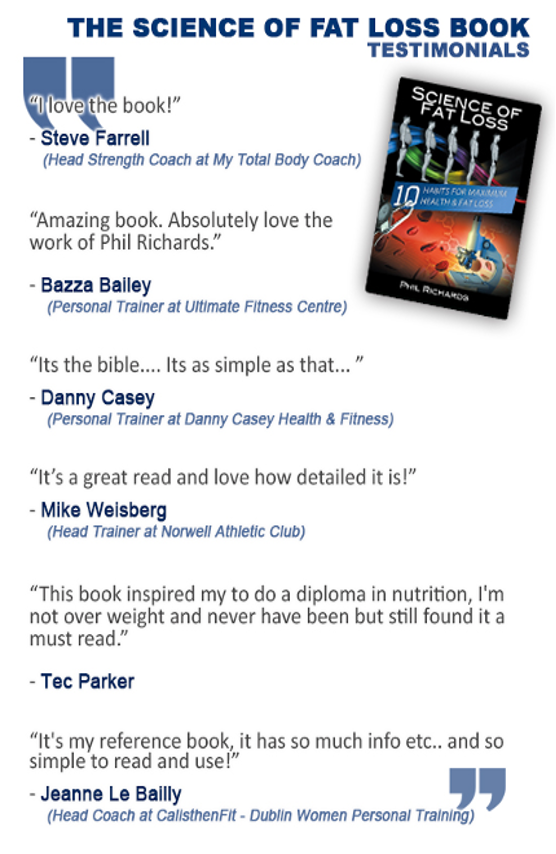Science of Fat Loss by Phil Richards
The Science Of Fat Loss Book is based on science and my personal experience with fat loss which began in 1989 for myself when, after being a competitive cyclist and runner for several years I decided to start doing some serious weight training.
In 2 years, I went from 60 kgs to 110 kgs almost doubling my weight and unfortunately not all of this was muscle. I then had to battle with my weight over several years and this motivated me to find out firstly what causes obesity and then what are the most effective ways to lose excess body fat safely, effectively & long term.
£24.99
Availability: In Stock
Availability: In Stock
Product Information & Details
Science of Fat Loss by Phil Richards
“Phil Richards Science Of Fat Loss Book is one of the best books I’ve read on the subject and every trainer should read this book”
DR ERIC SERRANO (WORLD LEADING HORMONAL EXPERT)
The Science Of Fat Loss Book is based on science and my personal experience with fat loss which began in 1989 for myself when, after being a competitive cyclist and runner for several years I decided to start doing some serious weight training. In 2 years, I went from 60 kgs to 110 kgs almost doubling my weight and unfortunately not all of this was muscle. I then had to battle with my weight over several years and this motivated me to find out firstly what causes obesity and then what are the most effective ways to lose excess body fat safely, effectively & long term.
In 1989 I then started studying nutrition and completed many courses on the subject but in those days, there was very little information on obesity. It wasn’t until 1997 when I became head of strength and conditioning with a professional rugby team that I really started zoning in on fat loss. Why? I noticed there were a few players that were obese, and I needed to get them leaner to ensure they could perform at the highest level that professional rugby demanded so the team I worked with could win league titles and cup finals.
This was when I realised that exercise is not that effective for fat loss for a lot of people. These players were training hard, undertaking strenuous gym sessions, running extensively during their on-field skills sessions, and playing one of the most brutal physical games in the world every week. And yet quite a few of them were still obese and got fatter as the season went on even after following a strict nutrition and supplement plan.
Winding the clock forward to 2006 – 2007, after 10 years in professional rugby and being very successful with the teams I worked with winning multiple league titles and cup finals I then spent a whole year working as a body fat composition expert (meaning my role was to get players as lean as I possibly could) with 3 professional teams one in premiership football, one in premiership rugby union and one in rugby league, again all elite athletes.
Testimonial
“This excellent book will lead you through the whole fat loss issue. With obesity rates rising its impact on the health of the nation could be immense. Every nutritionist, medical professional concerned about health and those in the fitness industry can glean tremendous knowledge from this informative book”.
Dr John Anderson (Mercury Free Dentist)
My role was to take body fat readings every week from each player, go through their food and training diaries, run hydration testing on them and then advise accordingly to get them to a desired body fat %. This is when I really started to understand that genes play a massive role in obesity, also that there isn’t a one diet that fits all for fat loss; for example, some players could get super lean on high carbohydrates and some get super fat on high carbohydrates, then you have high responders to exercise who can put muscle on very easy and zero responders to exercise where no matter how hard they train they put zero muscle on and lose zero fat.
It was also during this period I started to suspect that other factors such as pesticides, heavy metals, toxins, dental materials, and wash care product ingredients were also contributing significantly towards many of the players high levels of body fat. My research today supports my suspicions, and these factors have now even been given their own name of obesogens.
I then went on to work with professional boxers and Olympic athletes who also had to be super lean for their respective sports. I had to ensure that my training, nutrition and supplement protocols were absolutely spot on with this group as their career was dependant on my ability in these areas.
It was at this stage in my career I started writing a book titled the Science Of Fat Loss. It took me 10 years to gather the information for this 730 paged book and to write it. Even though the book was published in 2013 its still in my opinion one of the most thorough books ever written on the subject of fat loss and has made a huge impact on many people from all walks of life.



